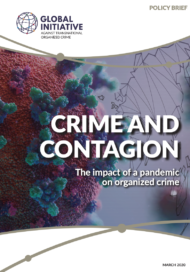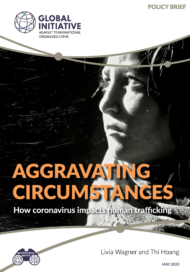Posted on 31 Mar 2020
In the first of our weekly #CovidCrimeWatch bulletins, we explored the implications of social distancing on illicit economies around the world. The impact of remote working on cybercrime vulnerabilities; links between school closures and criminal opportunism; and the mafia fugitive whose nicotine addiction cost him his freedom were just some of the stories we covered.
This week,
we turn our attention to criminal governance and some of the most vulnerable
people during this pandemic. Focusing on Latin America, where the coronavirus
is spreading rapidly, we look at gang-imposed curfews, how the crisis is
affecting extortion practices and why some groups are particularly vulnerable.
Our accompanying blog this week highlights the need to build up state institutions and civil society – not only to improve their responses, but also to meet people’s needs in areas, such as service delivery, where criminal groups might try to fill the void.
When governments refuse to take action, organized crime will
The Guardian, 25 March 2020
While many
world leaders are taking strict measures to slow the spread of COVID-19 –
closing schools, banning public gatherings and imposing lockdowns on their
citizens – Brazil’s president, Jair Bolsonaro, downplayed the severity of the
pandemic. In an address to the nation, Bolsonaro accused the media of
fearmongering and called on the country’s mayors and governors to roll back
restrictions.
But if the
government refuses to take action, gangs in Rio de Janeiro’s favelas have
proven more than willing to take on the responsibility. Leaders of the Red
Command gang in the ‘City of God’ neighbourhood (Cidade de Deus) have imposed a
curfew on residents, forcing them to remain indoors after 8 pm and using
threats of violence to ensure compliance. The gangs appear to understand that
assuming the role of the state also means they have to provide benefits to
citizens, and have been handing out soap to community members. Nevertheless, as
explored in our report on the confrontation between state
and non-state actors in Rio, gang activity in the favelas is best
described as ‘urban authoritarianism’ and residents show obedience primarily out
of fear.
Allowing criminal
groups to lay down and enforce the law comes at a great cost, as it builds the
gangs’ legitimacy at the expense of state actors.
Extortionists show mercy, sometimes
El Periódico, 25 March 2020
In certain parts
of Central America, extortion is so endemic that it has become a daily feature.
In the Colonia John F Kennedy area of Guatemala City, businesses are obliged to
pay an extortion fee of between 75 and 150 Guatemalan quetzales (roughly US$10–15)
per week. However, following recent COVID-19 lockdown measures, gang members
(called mareros) in the capital city have waived the weekly fee.
Not all criminal groups, however, seem to be quite so charitable. As reported in the first #CovidCrimeWatch newsletter, shopkeepers in Mexico had threatened to withhold extortion payments as their supply of illicitly sourced goods began to dry up. Yet members of the Unión de Tepito gang in Mexico City insist that they will continue to collect payments. One member issued a warning to ‘start saving because there won’t be a reprieve because of the virus’.
Given the
importance of extortion payments in generating revenue for criminal gangs and ‘extending [their] economic
stranglehold over the communities they target’, gangs will be hoping to keep the
money coming in for as long as possible.
Death squads murder as coronavirus kills
The Guardian, 23 March 2020
As
governments in Latin America are increasingly restricting movement to halt the
spread of the virus and prevent as many deaths as possible, nationwide
lockdowns may be putting the lives of some people in peril. In Colombia, death squads
have been taking advantage of the lockdown to target activists. Three social leaders
have been killed, and local NGOs have warned that more murders may follow.
Across
Latin America, journalists are constantly in danger – not least in Mexico,
where no fewer than 12 journalists were killed in 2019 and there are countless
instances of threats, intimidation and kidnappings targeting journalists. Civil
society is a significant thorn in the side of organized-crime groups. Journalists,
activists and other community leaders are now forced to stay at home along with
the rest of the population. As security protocols, including government
protection, are abandoned, they become easy targets for criminal gangs. This
development is discussed by Siria Gastelum on the first episode of The Impact: Coronavirus and
Organized Crime – GI-TOC’s new podcast series.
Nevertheless,
activists across the region do not underestimate the importance of resilience in the face of injustice and will
undoubtedly continue speaking out.
Strengthened border control means strengthened smuggling networks
OCCRP, 18 March 2020
On 16
March, following an announcement by the Colombian president, Iván Duque, the
country closed its border with Venezuela to stop the spread of the coronavirus.
However, the 2 000 km-long boundary is plagued by illicit activity, with
an estimated 28 criminal groups operating along its extent. There are hundreds
of informal crossing trails (known as trochas), which are used to
smuggle everything from migrants to drugs and gold. The fear is that with
formal border crossings closed off, vulnerable Venezuelans fleeing their
country will be forced into the hands of criminal actors.
The phenomenon
of border displacement is an issue that the GI-TOC has explored before, most
recently in a study on the smuggling of migrants
through Bosnia and Herzegovina. The research found that strengthening borders between
Hungary and Serbia simply caused a shift in migrant routes to Bosnia and
Herzegovina. As more and more countries close their borders in response to the
global pandemic, vulnerable people may increasingly turn to criminal groups for
help.
Stay at home? Not an option for modern slaves
Thomson Reuters Foundation, 24 March 2020
The UK government has been emphatic over the last week
that everyone must stay at home, with people told not go to work unless
absolutely essential. But this isn’t an option for thousands of people ensnared
in modern slavery in the UK. It is unlikely that these victims of human
trafficking, who are exploited against their will, will be able to refrain from
working if compelled to do so by their traffickers. Worse still, should these
victims – who are often immigrant workers – show symptoms, they may be
reluctant to seek treatment for fear of prosecution as a result of the
post-Brexit ‘hostile environment’ policy.
There are at least three significant ways in which
COVID-19 could have severe ramifications for modern slavery, as explored by
Angharad Smith and GI-TOC Network member, James Cockayne. Firstly, those
already in situations of exploitation are at an increased risk. They are more likely
to become infected due to densely packed work environments and suffer exclusion
from adequate healthcare. Secondly, huge numbers of people are becoming unemployed
as a result of the economic impact of the pandemic. This, too, will mark a
significant increase in the supply of workers who are vulnerable to
exploitation. And, thirdly, the response to modern slavery – from both the
government and civil-society organizations – is likely to be fragmented as a
result of the social and economic disruptions caused by COVID-19.
GI-TOC will explore human-trafficking risks and
vulnerabilities created by the coronavirus in an upcoming policy brief later in
our COVID-19 series.
READ MORE:



